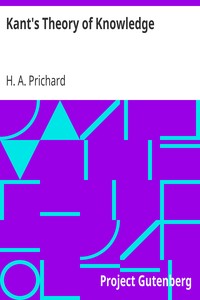Kant's Theory of Knowledge by H. A. Prichard
"Kant's Theory of Knowledge" by H. A. Prichard is a philosophical text written in the early 20th century. The book explores the complexities of Immanuel Kant's Transcendental Idealism, particularly focusing on the foundation and validity of 'a priori' knowledge. Prichard aims to clarify Kant's perspective on how human reason engages with concepts related to metaphysics, such as God, freedom, and immortality, offering a critical examination of the issues and arguments presented in
Kant's work. The opening of the text introduces Kant's quest to understand the limits and capabilities of human reason, specifically the nature of knowledge independent of experience. Prichard outlines the fundamental questions posed by Kant regarding metaphysics and the role of pure reason in grappling with subjects beyond empirical experience. He emphasizes that Kant believed any inquiry into these metaphysical questions necessitated an initial critical investigation into the capabilities of pure reason itself, laying the groundwork for a detailed examination of how 'a priori' synthetic judgments can exist and be validated. This exploration sets a philosophical framework for delving deeper into the nuances of Kant's ideas in subsequent chapters. (This is an automatically generated summary.)
Read now or download (free!)
| Choose how to read this book | Url | Size | ||||
|---|---|---|---|---|---|---|
| Read online (web) | https://www.gutenberg.org/ebooks/32701.html.images | 739 kB | ||||
| EPUB3 (E-readers incl. Send-to-Kindle) | https://www.gutenberg.org/ebooks/32701.epub3.images | 291 kB | ||||
| EPUB (older E-readers) | https://www.gutenberg.org/ebooks/32701.epub.images | 298 kB | ||||
| EPUB (no images, older E-readers) | https://www.gutenberg.org/ebooks/32701.epub.noimages | 285 kB | ||||
| Kindle | https://www.gutenberg.org/ebooks/32701.kf8.images | 596 kB | ||||
| older Kindles | https://www.gutenberg.org/ebooks/32701.kindle.images | 541 kB | ||||
| Plain Text UTF-8 | https://www.gutenberg.org/ebooks/32701.txt.utf-8 | 607 kB | ||||
| Download HTML (zip) | https://www.gutenberg.org/cache/epub/32701/pg32701-h.zip | 270 kB | ||||
| There may be more files related to this item. | ||||||
Similar Books
About this eBook
| Author | Prichard, H. A. (Harold Arthur), 1871-1947 |
|---|---|
| LoC No. | 09024195 |
| Title | Kant's Theory of Knowledge |
| Note | Reading ease score: 45.1 (College-level). Difficult to read. |
| Credits | E-text prepared by Meredith Bach, lizardcry, and the Project Gutenberg Online Distributed Proofreading Team (http://www.pgdp.net) from page images generously made available by Internet Archive/Canadian Libraries (http://www.archive.org/details/toronto) |
| Language | English |
| LoC Class | B: Philosophy, Psychology, Religion |
| Subject | Knowledge, Theory of |
| Subject | Kant, Immanuel, 1724-1804 |
| Category | Text |
| EBook-No. | 32701 |
| Release Date | Jun 5, 2010 |
| Copyright Status | Public domain in the USA. |
| Downloads | 177 downloads in the last 30 days. |
| Project Gutenberg eBooks are always free! | |

